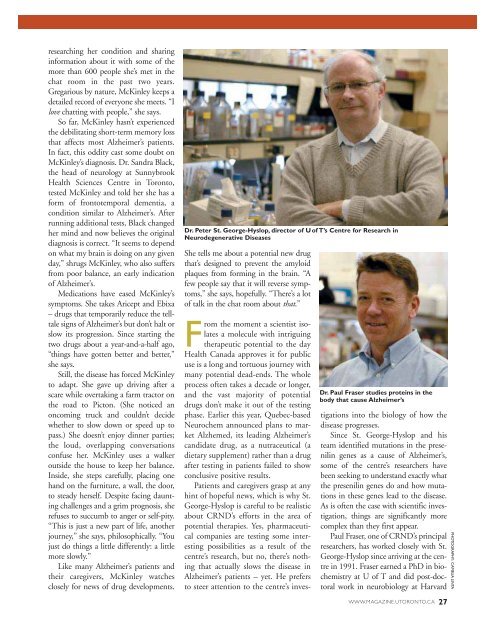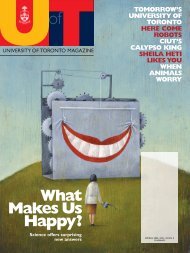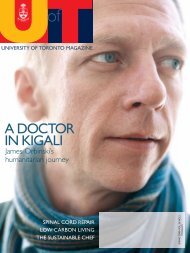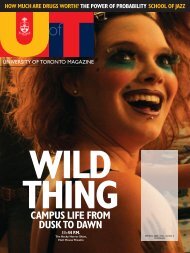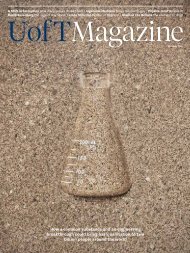THE HOUSE THAT DAVE BUILT - University of Toronto Magazine
THE HOUSE THAT DAVE BUILT - University of Toronto Magazine
THE HOUSE THAT DAVE BUILT - University of Toronto Magazine
Create successful ePaper yourself
Turn your PDF publications into a flip-book with our unique Google optimized e-Paper software.
esearching her condition and sharing<br />
information about it with some <strong>of</strong> the<br />
more than 600 people she’s met in the<br />
chat room in the past two years.<br />
Gregarious by nature, McKinley keeps a<br />
detailed record <strong>of</strong> everyone she meets. “I<br />
love chatting with people,” she says.<br />
So far, McKinley hasn’t experienced<br />
the debilitating short-term memory loss<br />
that affects most Alzheimer’s patients.<br />
In fact, this oddity cast some doubt on<br />
McKinley’s diagnosis. Dr. Sandra Black,<br />
the head <strong>of</strong> neurology at Sunnybrook<br />
Health Sciences Centre in <strong>Toronto</strong>,<br />
tested McKinley and told her she has a<br />
form <strong>of</strong> frontotemporal dementia, a<br />
condition similar to Alzheimer’s. After<br />
running additional tests, Black changed<br />
her mind and now believes the original<br />
diagnosis is correct. “It seems to depend<br />
on what my brain is doing on any given<br />
day,” shrugs McKinley, who also suffers<br />
from poor balance, an early indication<br />
<strong>of</strong> Alzheimer’s.<br />
Medications have eased McKinley’s<br />
symptoms. She takes Aricept and Ebixa<br />
– drugs that temporarily reduce the telltale<br />
signs <strong>of</strong> Alzheimer’s but don’t halt or<br />
slow its progression. Since starting the<br />
two drugs about a year-and-a-half ago,<br />
“things have gotten better and better,”<br />
she says.<br />
Still, the disease has forced McKinley<br />
to adapt. She gave up driving after a<br />
scare while overtaking a farm tractor on<br />
the road to Picton. (She noticed an<br />
oncoming truck and couldn’t decide<br />
whether to slow down or speed up to<br />
pass.) She doesn’t enjoy dinner parties;<br />
the loud, overlapping conversations<br />
confuse her. McKinley uses a walker<br />
outside the house to keep her balance.<br />
Inside, she steps carefully, placing one<br />
hand on the furniture, a wall, the door,<br />
to steady herself. Despite facing daunting<br />
challenges and a grim prognosis, she<br />
refuses to succumb to anger or self-pity.<br />
“This is just a new part <strong>of</strong> life, another<br />
journey,” she says, philosophically. “You<br />
just do things a little differently: a little<br />
more slowly.”<br />
Like many Alzheimer’s patients and<br />
their caregivers, McKinley watches<br />
closely for news <strong>of</strong> drug developments.<br />
Dr. Peter St. George-Hyslop, director <strong>of</strong> U <strong>of</strong> T’s Centre for Research in<br />
Neurodegenerative Diseases<br />
She tells me about a potential new drug<br />
that’s designed to prevent the amyloid<br />
plaques from forming in the brain. “A<br />
few people say that it will reverse symptoms,”<br />
she says, hopefully. “There’s a lot<br />
<strong>of</strong> talk in the chat room about that.”<br />
From the moment a scientist isolates<br />
a molecule with intriguing<br />
therapeutic potential to the day<br />
Health Canada approves it for public<br />
use is a long and tortuous journey with<br />
many potential dead-ends. The whole<br />
process <strong>of</strong>ten takes a decade or longer,<br />
and the vast majority <strong>of</strong> potential<br />
drugs don’t make it out <strong>of</strong> the testing<br />
phase. Earlier this year, Quebec-based<br />
Neurochem announced plans to market<br />
Alzhemed, its leading Alzheimer’s<br />
candidate drug, as a nutraceutical (a<br />
dietary supplement) rather than a drug<br />
after testing in patients failed to show<br />
conclusive positive results.<br />
Patients and caregivers grasp at any<br />
hint <strong>of</strong> hopeful news, which is why St.<br />
George-Hyslop is careful to be realistic<br />
about CRND’s efforts in the area <strong>of</strong><br />
potential therapies. Yes, pharmaceutical<br />
companies are testing some interesting<br />
possibilities as a result <strong>of</strong> the<br />
centre’s research, but no, there’s nothing<br />
that actually slows the disease in<br />
Alzheimer’s patients – yet. He prefers<br />
to steer attention to the centre’s inves-<br />
Dr. Paul Fraser studies proteins in the<br />
body that cause Alzheimer’s<br />
tigations into the biology <strong>of</strong> how the<br />
disease progresses.<br />
Since St. George-Hyslop and his<br />
team identified mutations in the presenilin<br />
genes as a cause <strong>of</strong> Alzheimer’s,<br />
some <strong>of</strong> the centre’s researchers have<br />
been seeking to understand exactly what<br />
the presenilin genes do and how mutations<br />
in these genes lead to the disease.<br />
As is <strong>of</strong>ten the case with scientific investigation,<br />
things are significantly more<br />
complex than they first appear.<br />
Paul Fraser, one <strong>of</strong> CRND’s principal<br />
researchers, has worked closely with St.<br />
George-Hyslop since arriving at the centre<br />
in 1991. Fraser earned a PhD in biochemistry<br />
at U <strong>of</strong> T and did post-doctoral<br />
work in neurobiology at Harvard<br />
WWW.MAGAZINE.UTORONTO.CA 27<br />
PHOTOGRAPHY: CAMELIA LINTA


